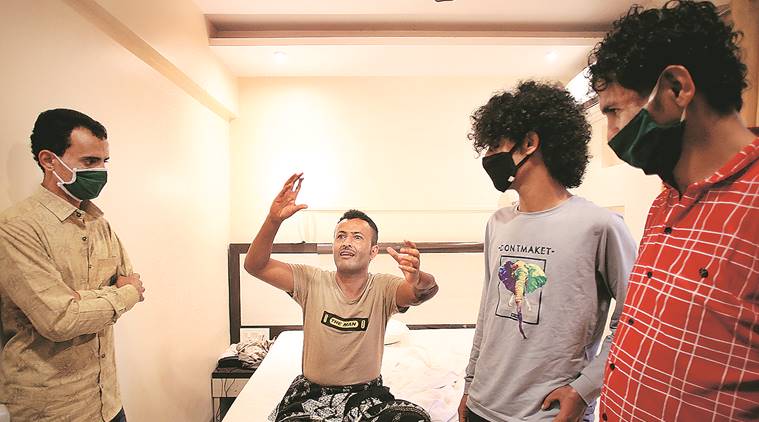SOURCE: ENS

BE IT the battlefields of Yemen or the trap he fell into in India, Muhammad Gibran Saleh Gibran has only one name for those responsible: “Bad men”. One of them fired the bullet that shattered a part of his face two years ago, and two others “ran away” with his passport and money in Mumbai.
The 26-year-old is among several soldiers who were flown over in January for specialised treatment by Yemen’s exiled government after they were injured in the civil war that erupted in 2015 between a coalition led by Saudi Arabia and Iran-backed Houthi rebels. Today, the soldiers are confined to their hotel rooms, awaiting surgeries stalled by the Covid lockdown, nursing landmine injuries, gunshot wounds and shattered bones. And, Gibran has as much disdain for his compatriots fighting for the Houthis as for the two Yemeni nationals who allegedly scammed him and have since been arrested.
“In Yemen we are fighting Iran, and in India we are troubled by cheats… our own people,” says Gibran, an Inspector in the Yemen Army, who has been put up at a hotel in Vashi with five colleagues.
The UN has termed the Yemen war as the world’s worst humanitarian disaster with over an estimated 100,000 people killed, more than 3 million displaced and nearly 3.2 million facing starvation. And the governments of Saudi Arabia and Yemen have an agreement with Fortis Group of Hospitals to treat wounded soldiers at their centres in Delhi, Mumbai and Pune.
The soldiers say that before the pandemic struck, when tests and surgeries were underway at Fortis Hospital in Mulund, a fellow soldier being treated in Pune lured the group with the promise of better treatment at another hospital in Navi Mumbai in February.
They say that the soldier connected them to two Yemeni translators, Fahad Razwan Al-Maktari and Abdulgani Ali Al-Guzi. Taken in by promises of quick treatment and return — Al-Guzi falsely claimed to be working with the Yemen Embassy in Delhi — the soldiers say they were admitted to another hospital in violation of the agreement with Fortis and tricked into surrendering their passports.
The two accused allegedly used the passports to withdraw 11,500 Saudi Arabian Riyals (Rs 2.05 lakh) that the Yemen government had wired for the soldiers. Gibran then lodged a police complaint following which the duo was arrested in Powai last month-end.
“Al-Guzi and Al-Maktari were arrested and booked last month by the Powai police on charges of cheating and forgery. They were released on bail last week,” says Ankit Goyal, Deputy Commissioner of Police. “We have seized the passports from the custody of the accused. Once the complainant writes to the court, and the court passes an order, we will release the passports.”
Fortis Hospital declined comment when contacted by The Indian Express. Yahya Yahya Ghobar, Consul General of Yemen in Mumbai, called for “greater protection” of Yemeni nationals being treated in Indian hospitals. “India has a very good reputation in Yemen. We know that India has good hospitals and the best treatment, but such cases of cheating will affect this reputation,” he told The Indian Express.
In Vashi, housed in “comfortable” air-conditioned rooms and back in the care of Fortis, Gibran’s colleague, Abdel Fattah Ismail Omar Al-Rajhi (30), says he is afraid to even travel to the nearest branch of Western Union to withdraw money sent by a charity in Yemen. “Because of corona we cannot go anywhere. And I fear being caught outside without any documents,” he says.
The soldiers are hesitant to talk about the war beyond saying that they were hurt in exchange of fire. But the injuries are visible. Ismail has a wounded shoulder, Abdullah Khaled Al-Shagdari has a bullet wound on his left wrist, and Anis Ali Naji Al-Thamdi’s left leg is broken and wrapped in bandages.
Of the six, Gibran’s roommate Khaled Abbad Mohamed Saleh is the most severely injured. Fighting in the Yemeni city of Sa’dah, Saleh says he stepped on a landmine a year-and-a-half ago, losing his right leg below the knee and carrying deep scars on his left arm.
Gibran himself has only barely been able to speak coherently after undergoing extensive plastic surgery to repair his face. “I was lying on a bed for nearly two years before I came to India. It is only here that I have recovered,” he says.
Before the lockdown and once his shoulder had started healing, Ismail was keen to step outside. “We carry a love for Mumbai and India in our hearts. And when we finally go back home, we want to have something good to say to our family and friends. But so far, there is nothing,” he says.
from Indian Defence Research Wing https://ift.tt/304da5q
via IFTTThttp://idrw.org
No comments:
Post a Comment